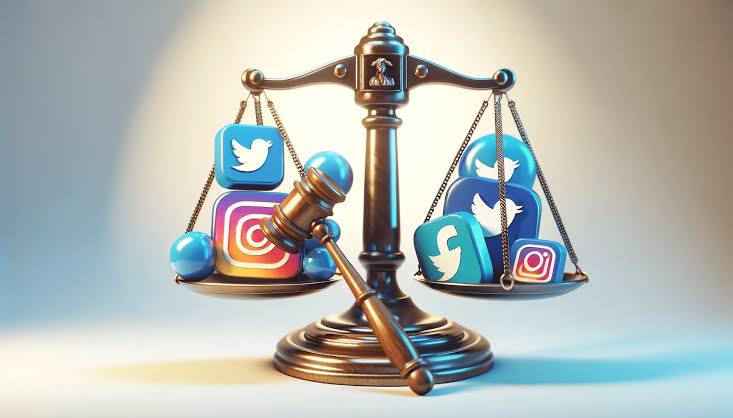Written by- Mr. Sandip Vimadalal, Advocate & Solicitor. Assisted by- Ritabh Singh, 5th year Law Student, Government Law College
20th September, 2024
INTRODUCTION
Social media has indeed been a boon for the society. A lesser talked evil of the use of social media has been its impact on children, especially the long-term effects which are thought not to have a direct connection with the use of social media. The short-term negative effects such as depression and suicides have been increasing[1] and the same applies to the long-term negative impacts. Indian lawmakers must focus their attention on this aspect of society to ensure the proper development and mental well-being of children.
PROBLEMS ASSOCIATED WITH SOCIAL MEDIA
An addiction is an activity in which a person finds it increasingly difficult to stop himself from indulging in the activity, even if the effects are known to be harmful. Society in general has developed Obsessive-Compulsive Disorder (OCD) to use social media, the biggest victims being children[2].
Puberty, being the age where most human development happens, is the age where children today venture on social media, i.e., a large group of strangers and an endless flow of all sorts of content. Social Media algorithm rewards extremism. The simple science is that consumption of such media leads to a spike of dopamine which, after going offline, leads to a great crash, creating a craving for the same activity. The current format of short videos is the best example of intermittent reinforcement, which makes the most intense and uncontrolled craving[3], leading to compulsive and thoughtless use.
Add to that highly unfiltered content and individuals freely contacting each other, the victims of which are mostly females and children. Graphic and violent content which is shared or viewed results in a traumatizing experience for developing brains, leaving a long-term negative impact[4].
One last problem to mention is reduced social interaction. Children are unable to develop necessary social skills which are developed through social interactions and sports. The possibility of proper brain development is reduced and so are the chances of making any meaningful bonds with others, leading to depression, anxiety, isolation and various mental disorders[5].
LEGISLATIONS IN THE WORLD
The Online Safety Act, 2023 has been passed by the parliament of the United Kingdom to curtail the risks of social media and to protect children.
The purposes that the Act aims to achieve include, but are not limited to –
(i) imposing duties on providers of services which are regulated by the Act to identify, mitigate and manage the risks of harm from—
(a) illegal content and activity;
(b) content and activity that is harmful to children.
(ii) conferring new functions and powers on the regulatory body to regulate such providers of services as well as the provided services.
Certain duties imposed on providers of services by the Act seek to secure, among other things, that the services regulated by the Act are—
(i) safe by design; and
(ii) designed and operated in such a way that—
(a) a higher standard of protection is provided for children than for adults;
(b) users’ rights to freedom of expression and privacy are protected; and
(c) transparency and accountability are provided for those services.
The act further defines what “user-to-user service” is and what “search service” is along with providing stringent regulations on the same.
The Act also imposes duties of care on providers of user-to-user services and search services and requires the created regulatory body to issue codes of practice relating to some of those duties.
A bill known as the “Social Media Child Protection Act”[6] has been tabled in the House of Representatives of the U.S. Congress providing that social media platforms are to prohibit children under the age of 16 from accessing such social media platforms. Such social media platforms are also to verify the age of their users by valid documents issued by the Federal or State government. The Bill also defines what “social media” is and has specifically included platforms like Facebook, Twitter, Instagram, Snapchat and TikTok.
Recently, Australian Prime Minister Anthony Albanese announced his intention to ban the use of social media for those under the age of 16, although a Bill is yet to be tabled[7].
Thus, it is internationally realized that children need to be protected from the harmful effects of social media.
REQUIRED LEGISLATIONS IN INDIA
Indian lawmakers are yet to consider this aspect of proper development and protection of children. Due to the nature of the effects of unfettered use of social media, our lawmakers will be committing a grave mistake by further pushing back this issue.
Social media can be used in many ways but is primarily used for content creation and communication. Thus, lawmakers have to inspect and frame specific laws for different types of social media. A few possible suggestions to curtail the abuse of social media and for the protection of children are as under –
(i) Adopting a strong Know Your Customer (KYC) system for creating a social media account can ensure a one-person-one account system while identifying and debarring bullies and trolls.
(ii) For a particular age bracket, compulsory parental consent should be mandated along with providing parents with parental controls and limited or customized data sharing.
(iii) Social media organizations shall be held heavily liable if any harmful content is shared or if any KYC norm or individual privacy is breached.
(iv) A regulatory body shall be established for the protection of children from online dangers and for acting as a tribunal for redressal and enforcement of necessary laws and to regulate social media organizations.
(v) Social media itself has to be made a safer place by restricting dangerous content while maintaining a delicate balance with freedom of expression.
OTHER INITIATIVES REQUIRED
Laws are usually a function of norms. If both are not in sync, great disagreement and conflict arise. Thus, any extreme move contrary to established norms will not fructify. The correct approach is to promote a subtle change of norms by incorporating the following methods –
(i) Schools must impart education on the proper use of social media, its advantages and disadvantages with a focus on the holistic development of children.
(ii) Parents themselves are important role models who must abstain from needless use of social media and indulge in fun family activities.
(iii) The government must take an active role in holding educational and awareness programmes on proper use of the same.
(iv) Society must encourage children’s participation in summer camps and field trips wherein they can bond without social media and develop meaningful bonds and experiences.
CONCLUSION
To avoid accidents, one does not stop riding a bike but wears a helmet. Applying this analogy, banning social media will be a regressive step. Proper regulation is the need of the hour for ensuring the protection of children.
Indian lawmakers must unite on this aspect and address the same in a unanimous voice.
[1] The role of online social networking on deliberate self-harm and suicidality in adolescents: A systematized review of literature – Aksha M. Memon, Shiva G. Sharma, Satyajit S. Mohite and Shailesh Jain – National Library of Medicine
[2] Social network sites and obsessive-compulsive disorder: An investigation with suppression analyses – Soon Li Lee
[3] The impact of the digital revolution on human brain and behavior: where do we stand? - Martin Korte, PhD – National Library of Medicine
[4] The Use of Social Media in Children and Adolescents: Scoping Review on the Potential Risks – Elena Bozzola and others – National Library of Medicine
[5] Brain health consequences of digital technology use - Gary W. Small, MD – National Library of Medicine
[6] H.R.821 – Social Media Child Protection Act –Congress.Gov
[7] https://www.zawya.com/en/world/china-and-asia-pacific/australian-pm-announces-plan-to-ban-children-from-social-media-ah0av079







